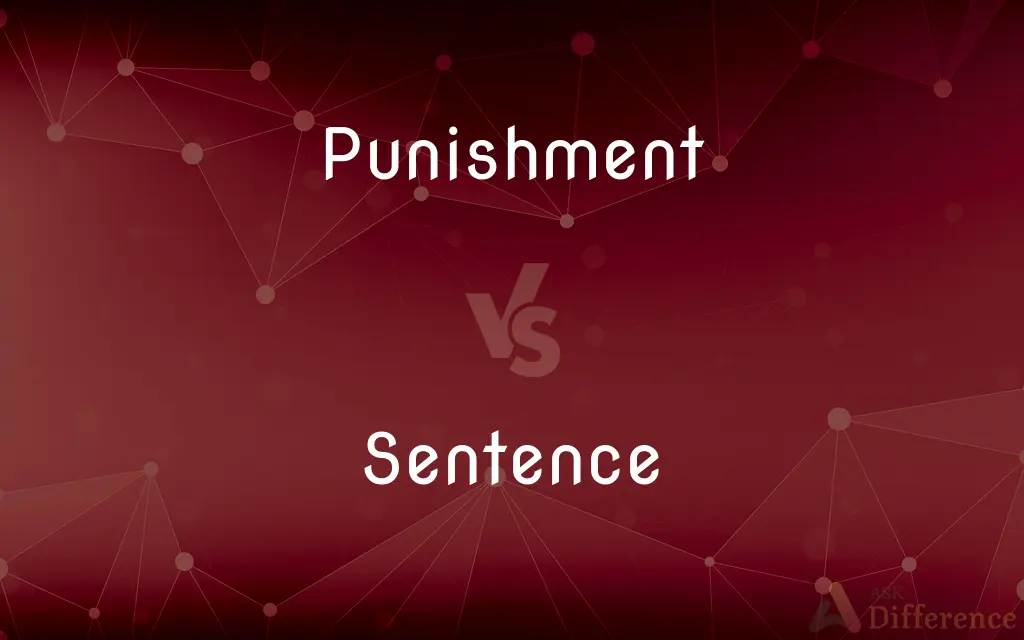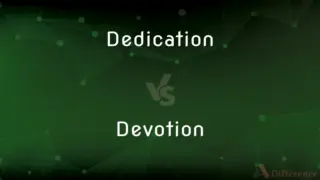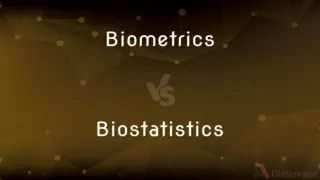Punishment vs. Sentence — What's the Difference?
By Fiza Rafique & Maham Liaqat — Updated on May 7, 2024
Punishment involves penalties for offenses, while a sentence is the formal legal consequence determined by a court.

Difference Between Punishment and Sentence
Table of Contents
ADVERTISEMENT
Key Differences
Punishment is a broad term that refers to any penalty imposed for wrongdoing, focusing on deterrence and retribution. Whereas, a sentence is a specific legal determination handed down by a court following a conviction in a criminal case. Punishments can vary widely and include informal social consequences, while a sentence is strictly defined by law and can include imprisonment, fines, or other legal sanctions.
Punishment is designed to deter individuals from committing offenses and to serve as a form of societal retribution. On the other hand, a sentence serves not only these purposes but also aims at rehabilitating the offender and protecting the public by removing dangerous individuals from general society.
Punishments can be meted out in various contexts, not just the criminal justice system, such as parental discipline or school-based sanctions. In contrast, a sentence is exclusively a product of the judicial process and is formally documented and regulated.
Punishments may not necessarily follow the formal legal procedures and can be immediate and personal. Conversely, a sentence is always the result of a judicial process, involving legal representation, trials, and adherence to procedural standards.
While punishments can be arbitrary and vary in severity, sentences are determined based on legal guidelines, precedents, and statutes, ensuring a degree of uniformity and fairness in judicial proceedings.
ADVERTISEMENT
Comparison Chart
Definition
Any penalty for wrongdoing.
Legal consequence determined by court.
Context
Can be informal or non-judicial.
Strictly judicial.
Purpose
Deterrence, retribution.
Deterrence, retribution, rehabilitation, public safety.
Regulation
Not strictly regulated.
Governed by legal standards.
Examples
Parental discipline, school sanctions.
Prison time, fines, probation.
Compare with Definitions
Punishment
A consequence intended to reform behavior.
The team's punishment for breaking rules included extra practice sessions.
Sentence
A formal declaration of punishment.
The sentence included community service in addition to fines.
Punishment
A penalty imposed for wrongdoing.
The punishment for cheating was detention after school.
Sentence
A judicial order following a conviction.
The judge handed down a five-year sentence.
Punishment
A method of enforcing discipline.
His punishment for repeated tardiness was loss of privileges.
Sentence
The outcome of a legal trial.
After the trial, the sentence was pronounced swiftly.
Punishment
A deterrent to prevent undesirable actions.
Harsh punishments serve as a deterrent to potential offenders.
Sentence
An element of the criminal justice system.
His sentence was delayed pending appeal.
Punishment
A retaliatory measure.
They saw the sanctions as a punishment against the country's policies.
Sentence
A legal consequence specific to criminal acts.
The sentence for burglary can vary depending on prior offenses.
Punishment
Punishment, commonly, is the imposition of an undesirable or unpleasant outcome upon a group or individual, meted out by an authority—in contexts ranging from child discipline to criminal law—as a response and deterrent to a particular action or behavior that is deemed undesirable or unacceptable. It is, however, possible to distinguish between various different understandings of what punishment is.The reasoning for punishment may be to condition a child to avoid self-endangerment, to impose social conformity (in particular, in the contexts of compulsory education or military discipline), to defend norms, to protect against future harms (in particular, those from violent crime), and to maintain the law—and respect for rule of law—under which the social group is governed.
Sentence
A grammatical unit that is syntactically independent and has a subject that is expressed or, as in imperative sentences, understood and a predicate that contains at least one finite verb.
Punishment
The imposition of a penalty or deprivation for wrongdoing
The swift punishment of all offenders.
Sentence
The penalty imposed by a law court or other authority upon someone found guilty of a crime or other offense.
Punishment
A penalty imposed for wrongdoing
"The severity of the punishment must ... be in keeping with the kind of obligation which has been violated" (Simone Weil).
Sentence
(Archaic) A maxim.
Punishment
Rough treatment or use
These old skis have taken a lot of punishment over the years.
Sentence
(Obsolete) An opinion, especially one given formally after deliberation.
Punishment
The act or process of punishing, imposing and/or applying a sanction.
The naughty children were given a punishment by their teachers.
Sentence
To impose a sentence on (a criminal defendant found guilty, for example).
Punishment
A penalty to punish wrongdoing, especially for crime.
A light punishment
A harsh punishement
Sentence
(dated) The decision or judgement of a jury or court; a verdict.
The court returned a sentence of guilt in the first charge, but innocence in the second.
Punishment
A suffering by pain or loss imposed as retribution
Sentence
The judicial order for a punishment to be imposed on a person convicted of a crime.
The judge declared a sentence of death by hanging for the infamous child rapist.
Punishment
(figuratively) Any harsh treatment or experience; rough handling.
A vehicle that can take a lot of punishment
Sentence
A punishment imposed on a person convicted of a crime.
Punishment
The act of punishing.
Sentence
(obsolete) A saying, especially from a great person; a maxim, an apophthegm.
Punishment
Any pain, suffering, or loss inflicted on a person because of a crime or offense.
I never gave them condign punishment.
The rewards and punishments of another life.
Sentence
(grammar) A grammatically complete series of words consisting of a subject and predicate, even if one or the other is implied, and typically beginning with a capital letter and ending with a full stop or other punctuation.
The children were made to construct sentences consisting of nouns and verbs from the list on the chalkboard.
Punishment
A penalty inflicted by a court of justice on a convicted offender as a just retribution, and incidentally for the purposes of reformation and prevention.
Sentence
(logic) A formula with no free variables.
Punishment
Severe, rough, or disastrous treatment.
Sentence
(computing theory) Any of the set of strings that can be generated by a given formal grammar.
Punishment
The act of punishing
Sentence
(obsolete) Sense; meaning; significance.
Sentence
(obsolete) One's opinion; manner of thinking.
Sentence
A pronounced opinion or judgment on a given question.
Sentence
To declare a sentence on a convicted person; to condemn to punishment.
The judge sentenced the embezzler to ten years in prison, along with a hefty fine.
Sentence
To decree, announce, or pass as a sentence.
Sentence
(obsolete) To utter sententiously.
Sentence
Sense; meaning; significance.
Tales of best sentence and most solace.
The discourse itself, voluble enough, and full of sentence.
Sentence
An opinion; a decision; a determination; a judgment, especially one of an unfavorable nature.
My sentence is for open war.
That by them [Luther's works] we may pass sentence upon his doctrines.
Sentence
A philosophical or theological opinion; a dogma; as, Summary of the Sentences; Book of the Sentences.
Sentence
In civil and admiralty law, the judgment of a court pronounced in a cause; in criminal and ecclesiastical courts, a judgment passed on a criminal by a court or judge; condemnation pronounced by a judicial tribunal; doom. In common law, the term is exclusively used to denote the judgment in criminal cases.
Received the sentence of the law.
Sentence
A short saying, usually containing moral instruction; a maxim; an axiom; a saw.
Sentence
A combination of words which is complete as expressing a thought, and in writing is marked at the close by a period, or full point. See Proposition, 4.
He fills, he bounds, connects, and equals all.
A king . . . understanding dark sentences.
Sentence
To pass or pronounce judgment upon; to doom; to condemn to punishment; to prescribe the punishment of.
Nature herself is sentenced in your doom.
Sentence
To decree or announce as a sentence.
Sentence
To utter sententiously.
Sentence
A string of words satisfying the grammatical rules of a language;
He always spoke in grammatical sentences
Sentence
(criminal law) a final judgment of guilty in a criminal case and the punishment that is imposed;
The conviction came as no surprise
Sentence
The period of time a prisoner is imprisoned;
He served a prison term of 15 months
His sentence was 5 to 10 years
He is doing time in the county jail
Sentence
Pronounce a sentence on (somebody) in a court of law;
He was condemned to ten years in prison
Common Curiosities
What does a sentence typically include?
A sentence typically includes imprisonment, probation, fines, or other legal measures.
How is punishment enforced in non-judicial contexts?
In non-judicial contexts, punishment is enforced by authorities like parents or educators without formal proceedings.
What role does the law play in determining a sentence?
The law provides guidelines, procedures, and standards that determine the nature and severity of sentences.
What is the primary goal of punishment?
The primary goal of punishment is to deter undesirable behavior and enforce societal norms.
Can punishment occur outside of legal proceedings?
Yes, punishment can occur in various non-legal contexts such as families or schools.
What makes a sentence different from other forms of punishment?
A sentence is specifically a judicial decree following a conviction, unlike other punishments that can be informal.
How do cultural perceptions affect punishment?
Cultural perceptions can significantly influence what is considered appropriate punishment in different contexts.
Is retribution a component of both punishment and sentences?
Yes, both punishment and sentences can serve retributive purposes, aiming to right wrongs by penalizing the offender.
Is a sentence always punitive?
Yes, a sentence always includes punitive elements but may also aim at rehabilitation and public safety.
Can both punishment and sentences be appealed?
Sentences can be appealed in higher courts, but informal punishments usually do not have a formal appellate process.
What is the impact of a sentence on an individual's criminal record?
A sentence typically results in a criminal record, which can affect future employment, travel, and more.
Share Your Discovery

Previous Comparison
Dedication vs. Devotion
Next Comparison
Biometrics vs. BiostatisticsAuthor Spotlight
Written by
Fiza RafiqueFiza Rafique is a skilled content writer at AskDifference.com, where she meticulously refines and enhances written pieces. Drawing from her vast editorial expertise, Fiza ensures clarity, accuracy, and precision in every article. Passionate about language, she continually seeks to elevate the quality of content for readers worldwide.
Co-written by
Maham Liaqat












































